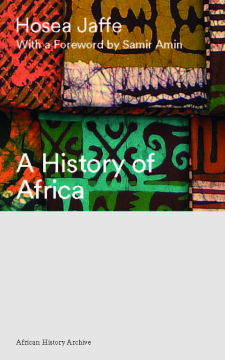
Additional Information
Book Details
Abstract
Spanning more than two thousand years of African history, from the African Iron Age to the collapse of colonialism and the beginnings of independence, Hosea Jaffe's magisterial work remains one of the few to do full justice to the continent's complex and diverse past.
The great strength of Jaffe's work lies in its unique theoretical perspective, which stresses the distinctive character of Africa's social structures and historical development. Crucially, Jaffe rejects all efforts to impose Eurocentric models of history onto Africa, whether it be liberal notions of 'progress' or Marxist theories of class struggle, arguing instead that the key dynamics underpinning African history are unique to the continent itself, and rooted in conflicts between different modes of production.
The work also includes a foreword by the distinguished economist and political theorist Samir Amin, in which he outlines the contribution of Jaffe’s work to our understanding of African history and its ongoing post-colonial struggles.
‘[Jaffe’s] views are indeed stimulating … and should reopen a discussion of great importance … I cannot but welcome this History of Africa which our comrade Hosea Jaffe offers us.’
Samir Amin, from the Preface
'Hosea Jaffe, an incisive thinker, presents a very readable analysis of African history. His book, which is of major theoretical importance, provides many insights into African nationalist, class and other struggles, past, present and future.'
Richard Pankhurst, Royal Asiatic Society
Hosea Jaffe was a distinguished historian, economist, and radical activist. Born in South Africa in 1921, he was active in early anti-apartheid politics, until he was forced to flee the country in 1960. Over the course of his life he taught at universities throughout Africa and Europe, and authored numerous works on African history, politics and global economics. He died in Italy in 2014.
Samir Amin is a renowned radical economist, the director of the Forum du Tiers Monde (Third World Forum) in Dakar, Senegal, and chair of the World Forum for Alternatives.
Table of Contents
| Section Title | Page | Action | Price |
|---|---|---|---|
| Front Cover | Front cover | ||
| About the Author | iii | ||
| Title Page | v | ||
| Copyright | vi | ||
| Contents | vii | ||
| Abbreviations and Acronyms | ix | ||
| Preface | 1 | ||
| Part One: African Communism and Despotism | 5 | ||
| The Present as Colonialised Past | 8 | ||
| The African Iron Ages | 10 | ||
| Gentile Communism | 12 | ||
| Egypt, Nubia, Meroe, Axum | 13 | ||
| The European and Non-European Modes of Production | 15 | ||
| The Communal-Despotic Dialectic | 18 | ||
| No Property in Land and People | 19 | ||
| Zanj | 21 | ||
| Tribal Despotisms | 22 | ||
| The Pre-Colonial 'Surplus Axis' | 24 | ||
| The 'Khaldoun' Class Struggle | 26 | ||
| Primitive Communism | 28 | ||
| The 'African-European' Mixed Mode of Production in Ethiopia | 30 | ||
| African Communal Despotism | 31 | ||
| Notes | 34 | ||
| Part Two: European Colonialism — Resistance and Collaboration | 41 | ||
| Colonialism as Genesis of Europe | 45 | ||
| The Resistance-Collaboration Contradiction | 47 | ||
| Colonialism as Genesis of Race | 56 | ||
| Types of Racial Colonies | 58 | ||
| Liberatory Despots or Despotic Liberators? | 59 | ||
| Capitalist Retribalization | 60 | ||
| Notes | 64 | ||
| Part Three: Africa in the Inter–National Class Struggle | 69 | ||
| Imperialism as Fascism | 73 | ||
| Early South African Anti-Racist Class Struggles | 75 | ||
| Political Strikes in Africa | 77 | ||
| The Racist European Semi-Proletariat | 81 | ||
| Racist Liberalism | 85 | ||
| The Imperialist Missionaries | 89 | ||
| Indirect Rule: No National Bourgeoisie | 92 | ||
| 'Pre-Capitalist Economy' or Capitalist Labour Reserves | 94 | ||
| The Proletarian Peasantry | 96 | ||
| The Location Sub-Bourgeoisie | 97 | ||
| Forms of Wage-Labour | 97 | ||
| Notes | 100 | ||
| Part Four: Imperialism — African Emancipation | 103 | ||
| Early Cape Political Movements | 107 | ||
| West African Socialism | 111 | ||
| Senegal: From Diagne to Senghor | 123 | ||
| South Africa: 'White' Communism | 126 | ||
| Between the Wars: An African 'Indian Summer' | 128 | ||
| National Wars-Nigeria, Algeria, Egypt, Morocco | 131 | ||
| Constitutional Nationalism – East and West Africa | 133 | ||
| The New Dependence – Independence | 134 | ||
| European Democrats and African Despots | 135 | ||
| The International Relations of Production | 137 | ||
| Paradoxes and Accidents: The African Revolution | 141 | ||
| Notes | 145 | ||
| Select Bibliography | 148 | ||
| Index | 163 |
